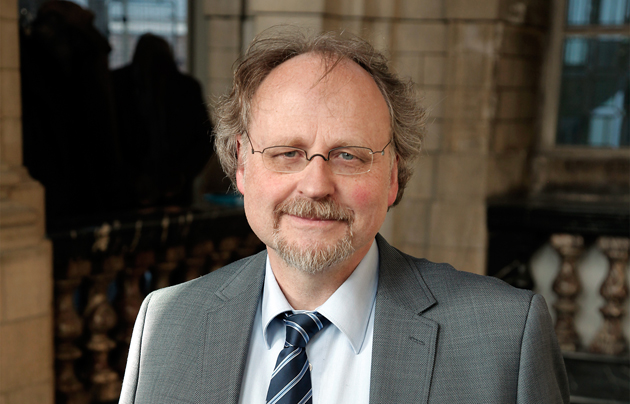U.N. rapporteur Heiner Bielefeldt suggests preventing violence in the name of religion through trust building and a political agenda based on freedom of conscience
 The UN special rapporteur for freedom of religion, Heiner Bielefeldt, shared his thoughts in a conference at the University of Leuven. / Rob Stevens, KU Leuven.
The UN special rapporteur for freedom of religion, Heiner Bielefeldt, shared his thoughts in a conference at the University of Leuven. / Rob Stevens, KU Leuven.
“Religious violence” is a hot topic today. Does religion cause violence? How can we prevent this violence from happening?
This was the theme of a conference last Friday in the Faculty of Canon Law at the University of Leuven (Belgium) where the UN special rapporteur on freedom of religion, Pr. Dr. Heiner Bielefeldt, shared his thoughts on violence in the name of religion.
The professor made a strong link between the political situation of a country and the emergence of violence, whether it be in the name of religion or an ideology, and insisted it is human beings (individuals) who perform these crimes, not religion, and consequently they can be held responsible for their acts. Not wanting to be “a fatalist” nor an “easy optimist”, he finished his lecture with some advice for governments and religious communities to work together to prevent future violence.
Mr. Bielefeldt started by stressing the title of his conference; he used the term “violence in the name of religion” rather than “religious violence” in order to make it clear that “human beings are the ones committing crimes, justifying them through religion”. This kind of violence “is an instrumentalisation, an abuse or distortion” that happens with all religions. The professor emphasised human beings and the individual dimension of crimes, stressing individual responsibility and also the individual protection of freedom of conscience as a human right.
‘RELIGIOUS CONFLICT’, A SIMPLISTIC TERM
As the professor cited examples of violence, he claimed it is simplistic to reduce for example conflicts in Africa as religious because the root causes are various. Bielefeldt explained the main political factor that opens the door to violence in the name of religion is the lost of trust in public institutions as a consequence of endemic corruption. “People lose trust and decide to organise their lives on their own”.
This organisation through private networks can be, for example, religious, which creates a group identity. “Lack of trust leads to narrowness; the external world provokes suspicion”. In this context, “polarising religious messages can become strangely attractive because they seem to match people’s mindsets and give practical solutions”.
Meanwhile, loss of trust in public institutions and the emergence of separate groups carry that loss to the public sphere where people used to experience religious diversity without fear. “Public discourse disappears and negative rumours spread easily”, such as a distorted interpretation of religion. In the end, the collapse of a “meaningful intergroup communication” brings society fragmentation.
For Mr. Bielefeldt, however, not everything is bad news. He is positive on counter-movements and good intergroup interreligious initiatives, like the Muslim “ring of peace” protecting the Oslo synagogue.
GOVERNMENTS: PROTECT RELIGIOUS FREEDOM FOR ALL
He advised governments that “the only way to take religion seriously without attacking diversity is to promote a religious political agenda based on freedom of religion”. Selecting or promoting one religious identity over the others provokes divisiveness. In his opinion, states should be trust builders, while remaining the guarantors of human rights.
On the other side, Mr. Bielefeldt stressed the importance for religious communities to take theology seriously “not turning it into a weapon to exclude others”, while the majority religious community learns to “overcome the pernicious equation of our territory”.
In parallel, civic society, including faith-based organisations, should challenge the entrepreneurs of hatred who claim to represent the silent majority. “It is crucial that the majority does not remain silent”.
Heiner Bielefeldt is the UN special rapporteur on freedom of religion, which means he investigates violations of human rights whether they are individual or collective, and can do field missions in the case a country invites him. Other activities are to raise awareness about freedom of religion as a human right. He is professor at University of Erlangen-Nuremberg where he very much enjoys teaching human rights, political thought and philosophy. He normally blocks his agenda at the beginning of the week in order to be able to teach.
The Faculty of Canon Law of University of Leuven is one of the few faculties that still teach Canon Law, the ecclesial law governing the Catholic Church, and it is internationally renowned.

Las opiniones vertidas por nuestros colaboradores se realizan a nivel personal, pudiendo coincidir o no con la postura de la dirección de Protestante Digital.
Si quieres comentar o